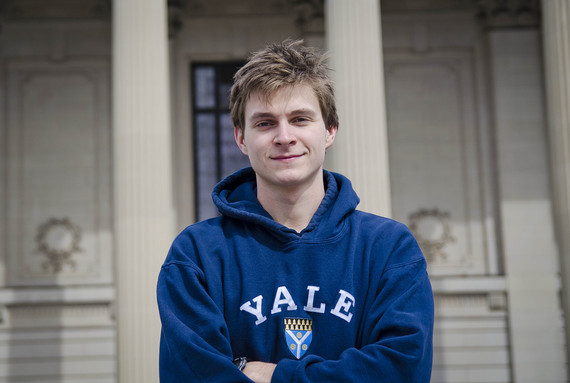As part of the ongoing series Keep The Future Here, OpedSpace in partnership with FWD.us brings to light the stories of high-skilled immigrants affected by America's broken immigration system. Although the current system is designed to provide international students with the best higher education in the world, upon graduation many of these students' visas expire and they are faced with the possibility of deportation or enduring the long and uncertain process of applying for an H-1B visa. The irony: many of these students are ready and eager to put their education to use in the U.S. and contribute to its economy in industries from technology to finance to engineering. Yet despite broad bipartisan support to mend this broken system, very little has been done, resulting in nearly 100,000 rejected H-1B applications. It's time for change. If you or someone you know would like to share a story, please email tewfik@opedspace.com and tweet @opedspace using #freedom2innovate.
Wojciech Osowiecki (New Haven, CT/Poland)
I came to study at Yale University from Poland, because I wanted to seek out academic opportunities in the U.S. I was eager to experience the "big world" and I was not disappointed. My college turned out be a fantastic community where no one paid attention to my origin. I wish it could have stayed that way after graduation, but unfortunately, without the right immigration status, I didn't have the same chances on the job market. As a chemistry student, I wanted to apply for scientific fellowships to support my research, but I was ineligible for all major financial sources. I've been fortunate enough to enter a chemistry PhD program at UC Berkeley, but many other immigrants are not so lucky.
As an international student in the U.S., I was granted the same privileges as American citizens but only on the campus ground. When summer approached and all my friends started talking about applying for internships, I have realized that many companies are not willing to go through the legal hassle of hiring an alien who requires a lot of additional paperwork. It hurts your future chances of applying for a full-time job, since your resume lacks necessary professional experience. And even if a company is willing to support you through a program called the OPT (Optional Practical Training), each month of work reduces the length of legal post-graduate employment, making planning for the future more and more stressful.
It is unclear to me what my situation will look like after I finish my PhD program. The easiest way to stay here is continue on the path to professorship; unfortunately, only about 10 percent of graduate students end up landing a professorship. I am very interested in the industry and tech opportunities as I'm passionate about tackling the climate change issue. Sadly, no one has a clear understanding of how likely I am to land such a job since my chances are affected by the H-1B lottery visa or a slim chance of self-petitioning for the green card. The eligibility requires "extraordinary ability in the sciences" or the National Interest Waiver, which regardless of my faith in my skills, sounds daunting.
The United States has one of the best scientific communities in the world, but in order to keep it this way, we must start thinking about the future. We must continue letting bright and talented people and their families stay in this country by fixing the H-1B lottery, clearing the green card backlog, and making it easier for students to stay and work after studying here.
Jan Kolmas (Palo Alto, CA/Czech Republic)
I came to the U.S. in August 2010 as an F-1 visa student. I was a freshman at Yale hoping to pursue a career in aerospace engineering. During my four years at Yale, I have learned what would never be possible back in the Czech Republic. However, I have also discovered that my aerospace career might not have a future in the U.S. Many aerospace as well as national institutes, such as NASA centers, are off limits for me because I am not a U.S. citizen. I could neither get an internship or a full time job at any of those places due to the restrictions of my F-1 visa.
It is disappointing that U.S. does such a good job with attracting brains from overseas, but also does such a poor job in keeping them around. I am now pursuing my Masters in Aerospace Engineering at Stanford, but after I graduate I will only have 18 months to find an employer to sponsor me for a work permit. If I do not find an employer, I will take my education from Stanford and Yale to a different country.
President Obama's executive actions are a first step for helping F-1 students like me. The actions will allow students to extend their time in the U.S. and keep contributing to this country after we earn our degrees. For STEM students like myself, executive action is important, but a legislative solution is needed to ensure the U.S. visa system works for all of the students it educates.
By Alexandra Schuster for OpedSpace

